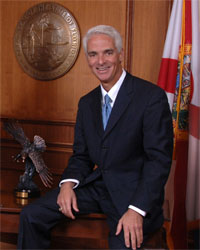Florida: Won’t enforce adoption ban

Charlie Crist
Florida Governor Charlie Crist (I) and George Sheldon, head of the state’s Department of Children and Families (DCF), said on September 22 that they would no longer enforce the state ban on adoption by gay men and lesbians.
The announcements came Wednesday after a state appeals court upheld a trial court decision that found the ban unconstitutional. The appeals court said that Frank Martin Gill, a gay man, has the right to adopt the two boys he and his partner have raised for almost six years.
But it remains an open question whether the state will appeal the case.
Gill issued a statement Thursday through the ACLU of Florida, which is representing him, saying, “I understand that the Governor would like to hear my views in considering whether to appeal the decision . . . . After considerable thought and consultation with my attorneys at the ACLU, it is my hope that the State will not appeal and the case will stop here.”
Leslie Cooper, senior attorney with the national ACLU’s LGBT Project, said that if the state decides not to appeal, the state appeals court decision will be binding on trial courts statewide and “will allow lesbians and gay men who are interested in adopting—no matter where they live in the State—to apply and be evaluated under the same criteria applied to everyone else.”
“This is precisely what our litigation has sought to achieve,” said Cooper.
If the state does appeals, Cooper said, “we’re confident that the Florida Supreme Court will reach the same result as the Third District Court of Appeal.”
The state Department of Children and Families (DCF) opposed Gill in the case but is now giving the decision “a thorough review,” said Communications Director Joe Follick.
“The primary consideration on whether to appeal,” said Follick, “is finding the balance between the value of a final ruling from the Florida Supreme Court versus the impact on the Gill family.” Follick noted that DCF plans to make a decision before its 30-day deadline.
Florida Attorney General Bill McCollum issued a statement through his communications director, saying the attorney general’s office would be “discussing” with DCF whether or not to appeal today’s ruling.
But DCF Secretary Sheldon said on September 20 that the state would not remove the two boys from Gill’s home even if the state Supreme Court decided to uphold the ban.
And Governor Crist, who is now running for the U.S. Senate, told reporters at a news conference Wednesday that he wanted to meet with Gill before deciding whether to appeal. As governor, he could order the DCF to do so.
Crist’s position on LGBT issues has shifted recently. On September 12, he announced his support for a range of civil rights for LGBT people, including adoption.
Even if there is no appeal, a hypothetical conflicting decision in another appellate court could limit the Third District’s ruling to just the Third District, not the whole state. But a spokesperson for the ACLU of Florida, Brandon Hensler, said he knew of no such cases pending and, “with the weight of the evidence we have on our side, we’re confident that if there were ever two competing appellate decisions, a Supreme Court decision would find the same as the Third District.”
Florida is the only state whose law specifically bans adoptions by all gay men or lesbians. Mississippi bans same-sex couples from adopting, and Arkansas, Michigan, and Utah ban unmarried couples (which, by definition, includes all same-sex couples in the state).
Although the ban will no longer be enforced, there is still another hurdle for same-sex couples in Florida: the question of joint adoptions by a couple or second-parent adoptions by one partner of the other partner’s legal child. Gill, in fact, has a partner (who remained unnamed in court documents). The men felt, however, that they would stand no chance in their case if they sued for a joint adoption.
In a concurring opinion, Third District Court Judge J. Salter pointed out that the case really involved five people: Gill, the two children, Gill’s partner, and the partner’s biological son.
“The bonds of attachment that have formed over the past six years are not limited to those between the two adopted children and the petitioner;” wrote Salter. “[T]he children have also established strong bonds with Tom Roe (a pseudonym) and his son (and they with the children). . . . The continued use of the legal system to attempt to unwind these relationships is simply inexplicable.”
In his statement, Gill said the state’s ban “has kept me from adopting the two boys who have known me as Papi for the past six years.”
“This deprives them of the emotional security of knowing they are part of a forever family,” said Gill. “The law is also an obstacle to adoption for countless other Florida children who have no family of their own.
“I am eager to adopt my two children and to remove this barrier to adoption for other children as soon as possible. Ending this case now would be the quickest way for that to happen.”


Leave a Reply